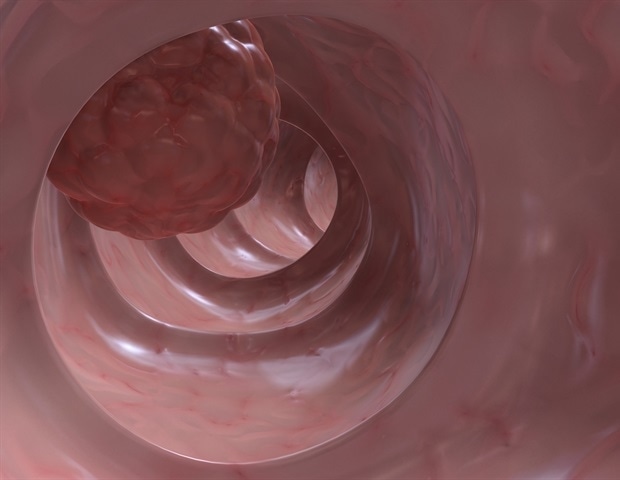
Microbes dwelling in our guts assist us digest meals by reshaping the bile acids that our livers produce for breaking down fat. It seems that two of those microbially-modified bile acids could have an effect on our threat -; in reverse instructions -; for growing colon most cancers.
The hyperlink between these bile acids and colon most cancers threat was just lately uncovered as College of Wisconsin–Madison scientists sought to higher perceive the connection between intestine microbes and our our bodies.
In some ways, that relationship revolves round a selected protein referred to as the farnesoid X receptor, or FXR, which helps preserve a wholesome intestine by way of its intimate relationship with bile acids. FXR controls the manufacturing of bile acids within the liver, but it surely additionally responds in numerous methods to the presence of assorted bile acids that microbes have modified.
“Some microbial bile acids assist FXR’s operate, whereas others antagonize it,” says Ting Fu, an assistant professor within the UW–Madison College of Pharmacy. Fu and her colleagues beforehand recognized the protein as a promising drug goal for treating inflammatory bowel illness and colitis, a debilitating gastrointestinal situation that raises the chance for colon most cancers.
Now, a group led by Fu, pharmacy professor Jiaoyang Jiang and Dustin Deming, an affiliate professor within the UW College of Medication and Public Well being, have recognized two microbial bile acids which have opposing results on FXR through the growth of tumors within the intestines, with one supporting its operate and the opposite inhibiting it.
Importantly, the bile acids’ affect on FXR interprets to their impact on the expansion of tumors, however with a twist. The bile acid that helps the protein’s operate slows the expansion of most cancers, whereas the bile acid that inhibits FXR acts as gasoline for the tumors.
These outcomes have been constant throughout mouse fashions of colon most cancers the researchers studied, together with organoids -; lab-grown miniature organs -; derived from human colon most cancers sufferers.
That is the primary time these particular microbial bile acids have been linked to both the event or safety towards colorectal most cancers. The group’s findings just lately appeared within the journal of the Proceedings of the Nationwide Academy of Sciences. The outcomes now present a roadmap for investigating potential new most cancers detection strategies and novel remedies.
Understanding these advanced mechanisms is a major step towards bettering early detection and growing focused therapies for colorectal most cancers. This examine not solely deepens our comprehension of the intricate relationship between intestine microbiota and most cancers, but additionally opens new avenues for medical developments that would doubtlessly profit hundreds of thousands worldwide.”
Xingchen Dong, postdoctoral researcher within the UW pharmacy college and lead writer of the paper
Fu says the bile acids’ opposing roles within the growth of intestinal tumors underscores how deeply advanced the neighborhood of microbes inside our guts is.
“I believe it is fascinating that microbes can modify bile acids on this approach and have such a big effect on our physique,” she stated. “Now we have extra microbes in our physique than our personal cells, so when one thing occurs to their atmosphere, like the expansion of a tumor, some good ones attempt to assist us right it. However that completely is determined by what they want, nutrition-wise.”
Supply:
Journal reference:
Dong, X., et al. (2024). The dichotomous roles of microbial-modified bile acids 7-oxo-DCA and isoDCA in intestinal tumorigenesis. Proceedings of the Nationwide Academy of Sciences. doi.org/10.1073/pnas.2317596121.

